An account is required to join the Society, renew annual memberships online, register for the Annual Meeting, and access the journals Practicing Anthropology and Human Organization
- Hello Guest!|Log In | Register
CONAA opens SfAA 2024 with exciting Roundtable Session on Querencia
By Karen Breda (U Hartford)
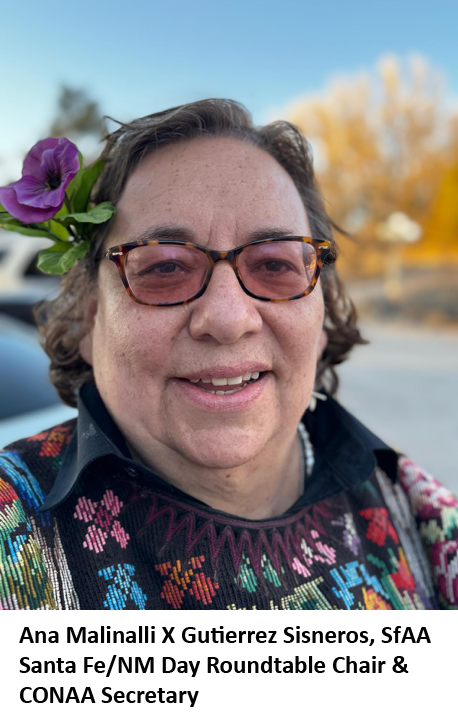 Querencia means “love of place, land, culture and people” says nurse and anthropologist Ana Malinalli X Gutierrez Sisneros. Locals in northern New Mexico use the term querencia to describe the feeling that calls them back to their towns and to their pueblo. It is the place where they feel connected to the earth. It is the place where they draw their strength, and where they feel truly at home. Ana X from Northern New Mexico College (NNMC) opened her Roundtable session Nuevo Mexico, Our Querencia: Enchanting Transformation through Applied Anthropology on Santa Fe/New Mexico Day with the traditional song “Arriba Nuevo Mexico” and a fervent call to respect the home of the Tewa people.
Querencia means “love of place, land, culture and people” says nurse and anthropologist Ana Malinalli X Gutierrez Sisneros. Locals in northern New Mexico use the term querencia to describe the feeling that calls them back to their towns and to their pueblo. It is the place where they feel connected to the earth. It is the place where they draw their strength, and where they feel truly at home. Ana X from Northern New Mexico College (NNMC) opened her Roundtable session Nuevo Mexico, Our Querencia: Enchanting Transformation through Applied Anthropology on Santa Fe/New Mexico Day with the traditional song “Arriba Nuevo Mexico” and a fervent call to respect the home of the Tewa people.
The well-attended session sponsored by CONAA - Council on Nursing and Anthropology www.conaa.org drew SfAA and CONAA attendees as well as members of “Tewa Women United” an advocacy organization that celebrates the collective power of families, communities, and Nung Ochuu Quiyo (Earth Mother) tewawomenunited.org.
Ana X described the plight of unhoused people living in tents along the banks of the river near Northern New Mexico college where a community farm, called ¡Sostenga! Farm, a soup kitchen, and an overfilled homeless shelter are located. The student body at NNMC in Española is 75% Latina/o and is located in one of the most underserved areas in the state. Food and housing insecurity are issues in many parts of the Española Valley
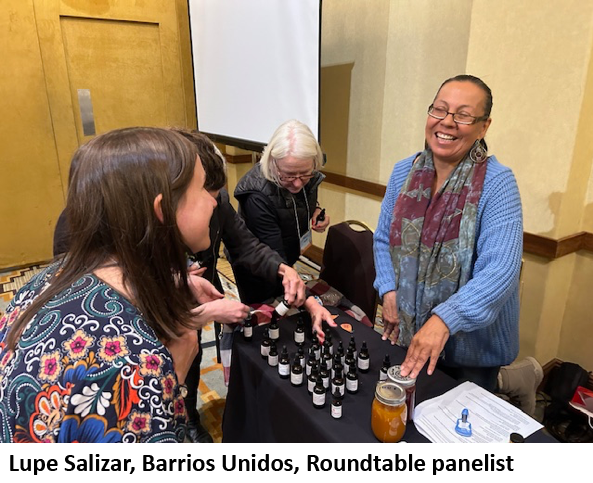 Panelist and local traditional healer Lupe Salazar from Barrios Unidos, in Chimayo, New Mexico discussed the high percentage of women raising their grandchildren and great grandchildren for family members (who may be in prison or who have died). Lupe, who attended the session with her two-year old granddaughter, uses the quote from Estevan Arellano “if we don’t learn to love them, we will never defend them" on the Barrios Unidos website www.barriosunidoschimayo.org. Lupe runs support groups for Barrios Unidos, formulates medicinal healing products from local herbs, and tends the outdoor meditation labyrinth located at the center. Barrios Unidos is an interdisciplinary, inter-generational and inter-cultural community investigating cultural and psychological issues related to addiction and cultural trauma in the Española Valley.
Panelist and local traditional healer Lupe Salazar from Barrios Unidos, in Chimayo, New Mexico discussed the high percentage of women raising their grandchildren and great grandchildren for family members (who may be in prison or who have died). Lupe, who attended the session with her two-year old granddaughter, uses the quote from Estevan Arellano “if we don’t learn to love them, we will never defend them" on the Barrios Unidos website www.barriosunidoschimayo.org. Lupe runs support groups for Barrios Unidos, formulates medicinal healing products from local herbs, and tends the outdoor meditation labyrinth located at the center. Barrios Unidos is an interdisciplinary, inter-generational and inter-cultural community investigating cultural and psychological issues related to addiction and cultural trauma in the Española Valley.
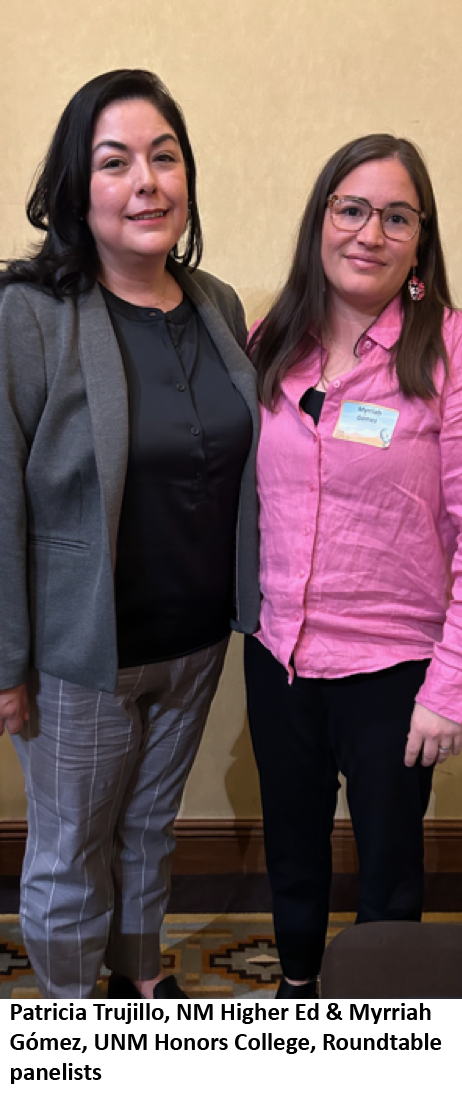 Roundtable panelist Patricia Trujillo, born and raised in the Española Valley, is the Deputy Secretary of the New Mexico Higher Education Department. Patricia is an expert in cultural sustainability and equity and diversity for historically underrepresented populations. Trujillo, who holds a PhD in U.S. Latina/Latino Literature, was on the faculty of Northern New Mexico College and was instrumental during the early years of the ¡Sostenga! Farm
Roundtable panelist Patricia Trujillo, born and raised in the Española Valley, is the Deputy Secretary of the New Mexico Higher Education Department. Patricia is an expert in cultural sustainability and equity and diversity for historically underrepresented populations. Trujillo, who holds a PhD in U.S. Latina/Latino Literature, was on the faculty of Northern New Mexico College and was instrumental during the early years of the ¡Sostenga! Farm
Myrriah Gómez (UNM Honors College), another roundtable panelist is an expert on nuclear colonialism and the effects of the Manhattan Project on northern New Mexico. Her book Nuclear Nuevo México, explores the effects of the nuclear industrial complex on Nuevomexicanas/os. Gómez discussed how her great grandparents were one of many Nuevomexicano families pushed off their land on the Pajarito Plateau when the U.S. government unlawfully acquired Los Alamos to create the Manhattan Project. Myrriah explained how settler colonialism in New Mexico opened the door for nuclear colonialism and how Los Alamos, as a racist project targeting New Mexican farming families and those in the Pueblo created a legacy of disease and distress in northern New Mexico that continues today. For more context, follow the link to this article: www.latinxproject.nyu.edu/intervenxions/the-truth-about-what-happened-here-new-mexico-and-the-manhattan-project.
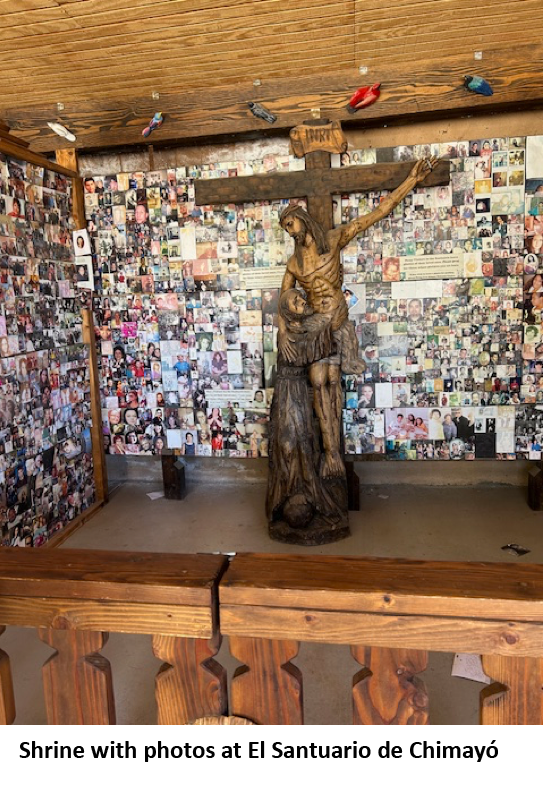 Later in the conference week on Thursday Ana X hosted a field trip to El Santuario de Chimayó a shrine located in the Sangre de Cristo Mountains of Chimayó, New Mexico. El Santuario de Chimayó is a holy place that stems in part from the discovery of a miraculous crucifix buried in the dirt there almost 200 years ago. The Pueblo Indians believe that much of the land, particularly the sacred hills and springs east of where today’s church was erected on the Santa Cruz River at “El Potrero” were sacred long before that time. The Tewa Indians had used the land for healing and as a part of their indigenous beliefs for centuries. With the imposition of Catholicism by the Spanish, the syncretism of elements of Christianity with traditional religions became necessary for survival.
Later in the conference week on Thursday Ana X hosted a field trip to El Santuario de Chimayó a shrine located in the Sangre de Cristo Mountains of Chimayó, New Mexico. El Santuario de Chimayó is a holy place that stems in part from the discovery of a miraculous crucifix buried in the dirt there almost 200 years ago. The Pueblo Indians believe that much of the land, particularly the sacred hills and springs east of where today’s church was erected on the Santa Cruz River at “El Potrero” were sacred long before that time. The Tewa Indians had used the land for healing and as a part of their indigenous beliefs for centuries. With the imposition of Catholicism by the Spanish, the syncretism of elements of Christianity with traditional religions became necessary for survival.
Today, El Santuario de Chimayó is an important Catholic pilgrimage site. During Holy Week thousands make the pilgrimage to El Santuario de Chimayó to coincide with Good Friday when it is believed that the sacred crucifix appeared to a Friar who was tending a field nearby. Since that time, American Indians and Latinas/os/Latinx from across the southwest have traveled to the site of El Santuario to seek out healing or to pray for an array of blessings for marriages, persons in the military, and other life experiences. Pilgrims leave offerings of many types, especially photos, in memory of or seeking grace for themselves, family, and friends.
Ana Malinalli X Gutierrez Sisneros, as a New Mexico history expert and Secretary of CONAA, was instrumental in bringing the SfAA group together and in teaching us much about the meaning of Querencia and the love of place, land, culture and people in the pueblo areas of northern New Mexico.
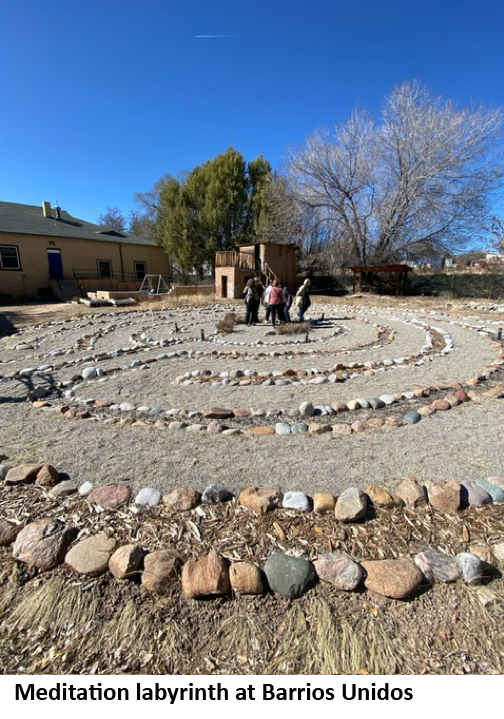
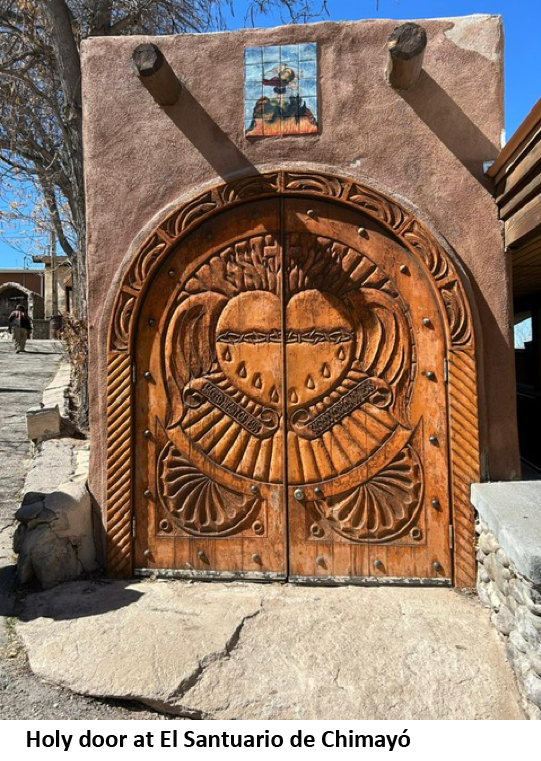
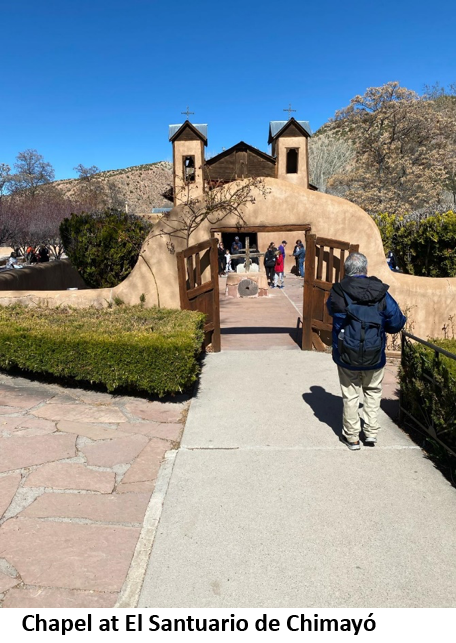
 The Council on Nursing and Anthropology www.conaa.org is an organization for those interested in both nursing and anthropology. We meet each year at the Society for Applied Anthropology (SfAA) meetings in the spring. For the past three decades, the Council on Nursing and Anthropology (CONAA) has gathered nurse-anthropologists, anthropologists, health care professionals, health social scientists, and friends for scholarly and evidence-based practice initiatives. If you are interested in submitting an abstract to a CONAA-sponsored session in the Portland, Oregon SfAA meetings in 2025, email Karen Breda at breda@hartford.edu.
The Council on Nursing and Anthropology www.conaa.org is an organization for those interested in both nursing and anthropology. We meet each year at the Society for Applied Anthropology (SfAA) meetings in the spring. For the past three decades, the Council on Nursing and Anthropology (CONAA) has gathered nurse-anthropologists, anthropologists, health care professionals, health social scientists, and friends for scholarly and evidence-based practice initiatives. If you are interested in submitting an abstract to a CONAA-sponsored session in the Portland, Oregon SfAA meetings in 2025, email Karen Breda at breda@hartford.edu.

Cart
Search